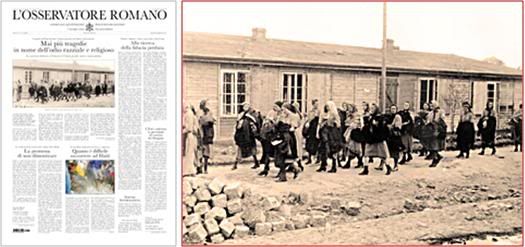 Thursday, January 28
Thursday, January 28
 Second from left, detail from Gozzoli's Triumph of St. Thomas,1471; and second from right, St. Thomas from a fresco by Fra Angelico, ca 1435.
ST. THOMAS AQUINAS (Tomasso d'Aquino] (Italy, 1225-1274)
Second from left, detail from Gozzoli's Triumph of St. Thomas,1471; and second from right, St. Thomas from a fresco by Fra Angelico, ca 1435.
ST. THOMAS AQUINAS (Tomasso d'Aquino] (Italy, 1225-1274)
Dominican , Philosopher-Theologian, Doctor of the Church (Doctor Angelicus)
Born the son of a count in a castle that still stands not far from Rome, Thomas was sent to the Benedictines at Monte Cassino at age 5. His parents expected him to grow up to become its abbot like his paternal uncle. But at 18, when studying in Naples, he was attracted to the Dominican Order. Two years followed during which his family 'imprisoned' him in the hope of dissuading him from joining the Dominicans. But eventually his mother helped him escape in a face-saving gesture, and he went on to Paris for further studies. Albertus Magnus was one of his teachers, and when he was sent to Germany, Thomas followed him to Cologne. In 1252, he returned to Paris where he was named master of theology at the university. In 1259, his order recalled him to Naples to set up a school, then went on to Rome in 1965 for the same purpose, at which time he began work on his masterpiece, the Summa Theologica. He returned to Paris in 1268-1272 for a second turn as master of theology at the university, after which he returned to Naples. During all this time, he wrote volume upon volume of what are considered to be the bedrock texts of scholastic theology. En route to the Second Council of Lyons in 1274, he struck his head on a tree and never fully recovered. A year before he died, he decided to stop writing, saying famously that "all I have written seems like so much straw compared to what has been revealed to me". He is a towering figure in the history of Western thought. Compared to what has been written about him as a thinker, not much is generally written about his spiritual life, but in many medieval images, he was portrayed as a mystic.
Readings for today's Mass: www.usccb.org/nab/readings/012810.shtml
OR today.

Benedict XVI's appeal at the General Audience on Holocaust Memorial Day:
'No more tragedies in the name of racial and religious hatred!'
His catechesis was devoted to Francis of Assisi - 'a great saint and joyous man'.
Other Page 1 stories: An editorial on the promise never to forget the Holocaust as the culmination
of man's evil; the 40th World Economic Forum in Davos takes place without government
representatives from the USA and China, as other governments and the private sector seek to
recover mutual trust; the IMF (International Monetary Fund) confirms China's projected growth
rate in 2010; and continuing frustration at the extreme difficulty of administering aid to Haiti's
earthquake victims. In the inside pages, two excellent articles on St. Thomas Aquinas, and
a review of the RAI TV movie on St. Augustine previewed a few months back by Benedict XVI.
THE POPE'S DAY
The Holy Father met today with
- Bishops of England and Wales (Group 2) on ad limina visit
- Members of the various Pontifical Academies. Address in Italian.

Benedict XVI has had only one occasion to speak about St. Thomas Aquinas so far. Here is part of what he said in an Angelus mini-homily on January 28, 2007:
With his charism as a philosopher and theologian, St. Thomas offered an effective model of harmony between reason and faith, dimensions of the human spirit that are completely fulfilled in the encounter and dialogue with one another.
According to St Thomas's thought, human reason, as it were, "breathes": it moves within a vast open horizon in which it can express the best of itself. When, instead, man reduces himself to thinking only of material objects or those that can be proven, he closes himself to the great questions about life, himself and God and is impoverished.
The relationship between faith and reason is a serious challenge to the currently dominant culture in the Western world...Human reason loses nothing by opening itself to the content of faith, which, indeed, requires its free and conscious adherence.
St Thomas Aquinas, with farsighted wisdom, succeeded in establishing a fruitful confrontation with the Arab and Hebrew thought of his time, to the point that he was considered an ever up-to-date teacher of dialogue with other cultures and religions. He knew how to present that wonderful Christian synthesis of reason and faith which today too, for the Western civilization, is a precious patrimony to draw from for an effective dialogue with the great cultural and religious traditions of the East and South of the world.
This became the basis for an excellent essay by Fr. James Schall.
Going by chronology, the Holy Father will be getting around soon to discussing Aquinas at his weekly catecheses.
[Modificato da TERESA BENEDETTA 28/01/2010 21:20]